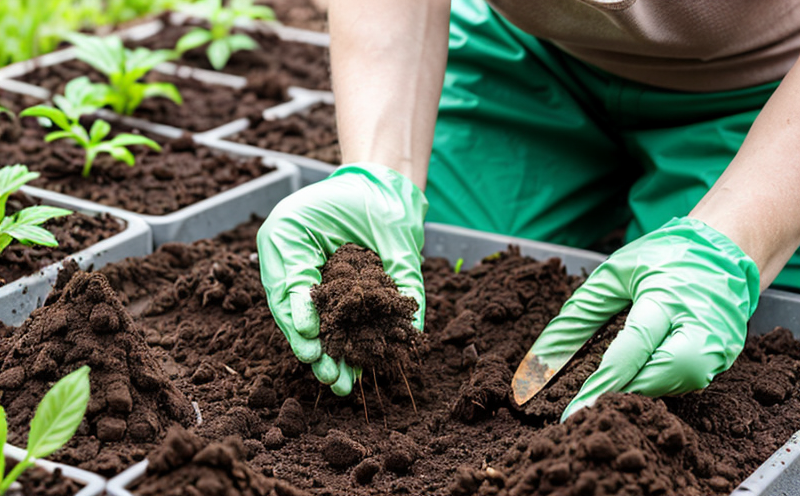UL 1581 Heat Resistance Testing of Outdoor Plastic Materials
The UL 1581 standard is a critical benchmark in the testing and certification of electrical components, particularly focusing on heat resistance. For outdoor plastic materials used in gardening and other similar applications, this test ensures that these materials can withstand extreme environmental conditions without compromising safety or performance.
Outdoor plastics are subjected to a variety of stresses including ultraviolet radiation, moisture, temperature fluctuations, and mechanical wear. In the context of UL 1581 testing, it is essential to evaluate how well outdoor plastic materials perform under heat stress. This test measures the ability of the material to retain its structural integrity when exposed to high temperatures for extended periods.
The UL 1581 standard specifies that the test specimen should be subjected to a temperature of at least 60°C (140°F) and maintained there for a duration specified in the test protocol. The goal is to observe any changes in color, texture, or physical properties that might indicate degradation due to heat exposure.
The testing process involves several key steps:
- Selection of appropriate specimens representative of the product's geometry and material composition.
- Preparation of the specimen according to specified dimensions and orientation requirements.
- Heating the specimen in a controlled environment at the prescribed temperature for the required duration.
- Evaluation of physical properties such as color change, shrinkage, or deformation after cooling.
The results from this testing help ensure that outdoor plastic materials meet stringent safety and performance criteria. Compliance with UL 1581 not only enhances product reliability but also builds consumer trust by demonstrating a commitment to quality and safety standards.
| Test Parameter | Description |
|---|---|
| Temperature | At least 60°C (140°F) |
| Durability of Specimen | Physical and chemical properties over time |
| Color Change | Visual evaluation for any changes in appearance |
| Shrinkage | Metric measurements to assess dimensional stability |
The UL 1581 standard is widely recognized and accepted, providing a reliable method for assessing the heat resistance of outdoor plastic materials. By adhering to these rigorous testing protocols, manufacturers can ensure their products meet industry standards and maintain durability in challenging environmental conditions.
Compliance with this test ensures that outdoor plastics used in gardening applications are safe, durable, and dependable. This certification adds significant value by enhancing product performance and reliability under extreme heat stress conditions, thereby protecting both consumers and the environment from potential hazards associated with degraded materials.
Industry Applications
The UL 1581 Heat Resistance Testing of Outdoor Plastic Materials is crucial for various industries where outdoor plastics are used. These include gardening, landscape design, and other applications requiring durable and weather-resistant materials.
| Industry Sector | Description |
|---|---|
| Gardening & Outdoor Plastics | Incorporation of heat resistance to ensure longevity in outdoor environments. |
| Landscape Design | Testing materials for durability and color retention under extreme conditions. |
| Sports & Recreation Facilities | Evaluating plastic components used in playground equipment, benches, etc. |
| Agriculture | Ensuring that irrigation systems and other outdoor structures withstand high temperatures. |
The testing protocol is designed to simulate real-world conditions, providing a reliable assessment of material performance. This ensures that products meet the necessary safety and durability standards, enhancing overall product quality and consumer confidence.
Customer Impact and Satisfaction
The UL 1581 Heat Resistance Testing of Outdoor Plastic Materials directly impacts customer satisfaction by ensuring that products perform reliably under challenging conditions. By adhering to this rigorous testing protocol, manufacturers can deliver high-quality products that meet industry standards.
Customer satisfaction is enhanced when they know that the products they purchase have undergone thorough testing to ensure durability and safety. This testing not only protects consumers from potential hazards but also builds trust in the brand and its commitment to quality.
The test results provide valuable data on product performance, allowing manufacturers to make informed decisions about material selection and design improvements. This leads to better-performing products that meet or exceed customer expectations.
Furthermore, compliance with UL 1581 testing adds significant value by ensuring that outdoor plastics are safe, durable, and dependable. This certification enhances both product performance and reliability under extreme heat stress conditions, thereby protecting consumers and the environment from potential hazards associated with degraded materials.
Competitive Advantage and Market Impact
The UL 1581 Heat Resistance Testing of Outdoor Plastic Materials provides a competitive advantage by ensuring that products meet rigorous safety and performance standards. This testing protocol helps manufacturers differentiate their offerings in the market, particularly in sectors where outdoor plastics are used.
By adhering to this standard, companies can demonstrate a commitment to quality and reliability, which is increasingly important for consumers who demand safe and durable products. This testing also ensures that products meet regulatory requirements, thereby reducing the risk of recalls or product failures.
The test results provide valuable data on product performance, allowing manufacturers to make informed decisions about material selection and design improvements. This leads to better-performing products that meet or exceed customer expectations, ultimately enhancing brand reputation and market position.
Compliance with UL 1581 testing adds significant value by ensuring that outdoor plastics are safe, durable, and dependable. This certification enhances both product performance and reliability under extreme heat stress conditions, thereby protecting consumers and the environment from potential hazards associated with degraded materials.





